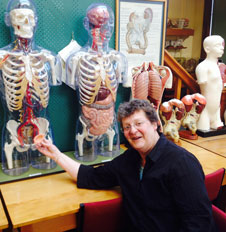Senior Lecturer in the Department of Anatomy, University of Otago

Dr Elspeth Gold will be remembered for her work on prostate cancer and her enormous energy for life.
Dr Elspeth Gold, a highly respected and valued colleague, mentor and friend to many in the University of Otago and beyond, lost her courageous battle with cancer on the 21 August 2015.
Elspeth was characterised by an enormous energy for life, for her research and her entirely selfless approach to the support, training and mentoring of her students and staff. She revelled in her research and teaching roles and in her short time as a member of academic staff in Anatomy (2009-2015) had a great many achievements: $1.6 M in external funding, prestigious postgraduate supervision awards and a bevy of exceptional students through her lab. It is thus apt that her promotion to Senior Lecturer, which she had put off several times due to health reasons, was recently confirmed.
Elspeth's work and outreach on prostate cancer was nationally and internationally significant. She published quality papers in good journals, but was always mindful of the translational opportunities emerging from her research and worked closely with the Prostate Cancer Foundation. In 2014 she received an Otago Innovation Proof of Concept grant and the work stemming from that project shows high potential to provide an enduring legacy.
"She revelled in her research and teaching roles and in her short time as a member of academic staff in Anatomy (2009-2015) had a great many achievements."
Elspeth was Otago through and through. She was born in Balclutha, and apart from a stint in Christchurch, spent most of her formative years at the University of Otago. She worked as a laboratory technician before completing a PhD at the University of Otago. She subsequently moved to Monash University for postdoctoral training before returning to Otago in 2009. She was in short, one of us, and represented many of our graduates' finest qualities.
Elspeth brought her passion and energy to her work and the wider Department. She was a true Departmental citizen, a regular attender of the tea room; even holding a seat at the “top table”. She was active in the academic life of the Department at one time running the seminar series, leading the Reproduction and Development group, convening courses and representing Anatomy on ethics committees. Elspeth excelled at all these roles and we knew that if Elspeth agreed to take on a role it would be done thoroughly with energy and enthusiasm.
Elspeth was also an excellent teacher. She enjoyed teaching and took it very seriously. She wanted to inspire the undergraduates and share her fascination and passion for science. She pushed boundaries and stretched students so that they had to think! But inspire she did and this led to her attracting many high quality students to do postgraduate studies with her. Some years she had to turn some students away – not an easy thing for Elspeth to do!
But Elspeth's greatest legacy was the importance she placed on training the next generation of scientists. For Elspeth giving back and training her PhD and Masters' students was paramount. Elspeth's skill as a supervisor was recognised through a University best supervisor award. Elspeth was a mentor as well as supervisor. She believed in pushing and challenging her students to try new things and move them out of their comfort zones, but always in the confidence that she was always there for them. As one of her students wrote: “Elspeth's complete lack of selfishness was her most impressive quality as a supervisor.” She spent her energy and resources to ensure her students had the best resources and opportunities including getting them to present at conferences from an early stage. As a good mentor/supervisor she also knew when to let her students go – but they were sent off with the clear expectations that they would learn to be better researchers and train future scientists.
"Elspeth was working right up to being hospitalised the week of her death and neither cancer, nor a badly broken arm would stop her from carrying out the work she truly cherished."
Elspeth was also exceptionally brave. Few likely knew the extent of her illness, and her passing seems entirely unfair and premature. Elspeth was working right up to being hospitalised the week of her death and neither cancer, nor a badly broken arm would stop her from carrying out the work she truly cherished.
Elspeth achieved so much in her comparatively short life. As her legacy she has trained some of the next generation of scientists. Even in that final week when her friends visited her in hospital it was her students that were at the front of her mind – and she had a list of things for them to do! Our task is to be grateful for the privilege of knowing Elspeth and to ensure that we carry on the good work that she has started.
As Francesco Elia Marino one of her PhD students wisely said: “A truly great mentor is hard to find, difficult to part with and impossible to forget.”
We in Anatomy respected and valued our friend and colleague Elspeth Gold and will not forget her and her many achievements here at Otago.
By Professors Neil Gemmell and Helen Nicholson